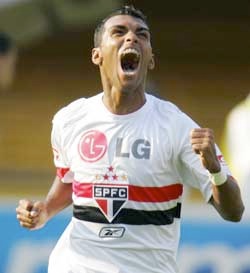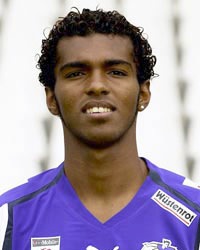health & sports
Out on the Field
Brazilian judge says gays don’t belong in soccer
Published Thursday, 23-Aug-2007 in issue 1026
Three weeks ago I wrote a column about the San Diego Sparks, a long-time gay and lesbian soccer club that plays nearly all of its games in a straight league. Shortly after the article appeared, a judge in Brazil issued a bizarre ruling that says gays don’t belong in soccer.
Judge Manoel Maximiano Junqueira Filho’s ruling responded to a slander lawsuit filed by Brazilian soccer great Richarlyson Felisbino, who said an executive for a rival team insinuated Felisbino is gay.
The brouhaha all started in June, when an article appeared in the Brazilian newspaper Agora that said a player in the country’s professional soccer league was planning to come out of the closet. During a television interview the following day, Jose Cyrillo, Jr., the director of the Palmeiras Soccer Club in Cape Verde, was asked if that announcement was going to be made by one of his players.
He said no, and then stuck his foot in his mouth when he added, “but Richarlyson almost played for Palmerias.” With his statement, Cyrillo deliberately suggested that Richarlyson, a midfielder for a rival club in Sao Paolo, was gay.
Richarlyson, who goes by only his first name, sued Cyrillo for criminal slander, but Judge Filho threw out the case, and issued a strongly-worded ruling saying that if Richarlyson was gay, he should leave the sport of soccer and, if he wasn’t, that he was obligated to go on television and deny it.
Futher, Filho said that a homosexual “must form his own team and federation,” and there was no room in professional soccer for gay players.
Filho concluded it was “not reasonable to accept homosexuals in Brazilian soccer because it would hurt the uniformity present.” The judge continued, adding that while soccer is a “virile game,” it is decidedly “not homosexual,” and allowing gays could lead to affirmative action for the sport requiring teams to adhere to quotas of gay players.
Of course, Filho caught hell from GLBT groups in the country. Much of it came straight from the “gays are outraged” playbook. Play one: gay “leaders” upstage each other to cite their displeasure, all the while explaining the damage done to closet gays and gay youth. Play two: leaders call for someone’s head. The final play, a hail mary, is the inevitable threat of a boycott.
Marcelo Cequeira, president of the gay rights organization Grupo Gay da Bahia, said the judge’s ruling “was a fascist statement and (he) needs to pay for it.” Cequeira then said there are several gay athletes playing in Brazil’s professional soccer league, but they fear recrimination if they come out.
Brazil’s governing body that oversees judicial ethics announced an inquiry into Filho’s ruling – and to head it off at the pass, the judge abruptly voided his own ruling last week, citing he lacks jurisdiction over the case. Then, he took a leave of absence with no date of return.
To date, no soccer player in Brazil, past or present, has said he is gay. The same can be said for most team sports in most countries, really.
What’s a bit strange is that Brazil, by and large, is a gay-friendly nation.
Consider this: at least three celebrated professional soccer players in Brazil have posed nude for gay magazines. Naked notables include World Cup veteran Vampeta, and Richarlyson’s Sao Paolo teammate Rogerio. Both vigorously maintain their heterosexuality.
In the United States, most professional athletes won’t even associate with GLBT organizations. If they did it could make life tough in the locker room, as well as destroy lucrative endorsement deals.
You don’t see former Padre Billy Bean pitching for Volvo, or former Vikings lineman Esera Tualoa doing American Express commercials. Both athletes came out of the closet after their playing careers were over.
In the United States, the GLBT community is still waiting for the first athlete in a major team sport to come out during his/her playing career.
It should be noted here that there are proud lesbians playing in the Women’s Tennis Association (WTA), including former world’s No. 1 Amelie Muaresmo.
But, something about a man coming out while still being paid to play for a football, hockey, baseball or basketball team would have a different effect.
Sure, there have been rumors of gay players, particularly in baseball. Hearing some talk, homosexuality in America’s favorite sport is almost as prevalent as steroids. But to date, no active Major Leaguer has taken the giant step forward to acknowledge being gay.
To be honest, I don’t necessarily think it’s that important.
If we believe that being gay has no bearing on our ability to perform effectively in the workplace, we should be content allowing gay athletes to come out of the closet on their own time.
For his part, Richarlyson did go on television as the judge suggested, and denied being gay. He also took it a step further, saying he refused to take insults from a judge. Then, he made a statement that makes us proud.
Taking a swipe at the judge and those who are likeminded, Richarlyson said, “All that matters is if the player can do his job on the field.”
|
|
Copyright © 2003-2025 Uptown Publications



